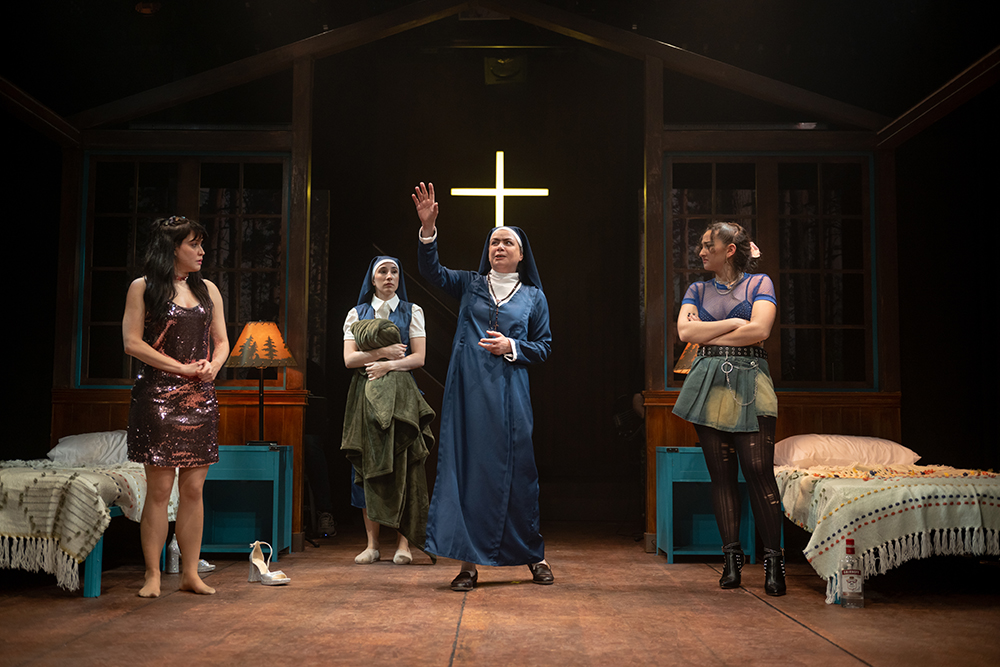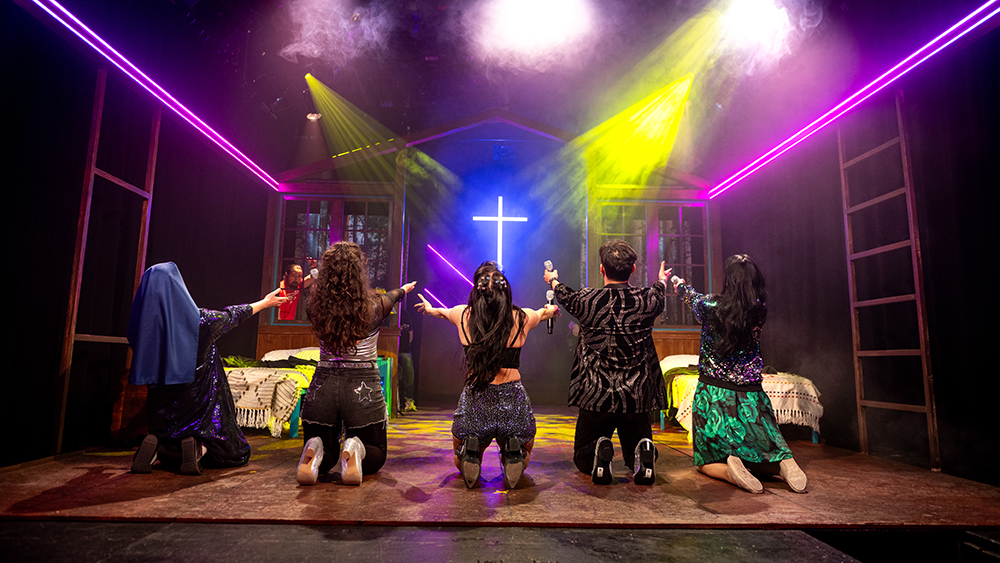
"La Llamada," the pop-infused musical making its U.S. debut at Repertorio Español this season in New York, is meant to welcome believers and non-believers alike. (Michael Palma Mir)
If God speaks in mysterious ways, why not use the lyrics of Whitney Houston? That's exactly what God does when appearing to María (Jenyvette Vega), a reggaeton-loving teenager who has no idea why an apparition would show up and speak in the "songs of the woman who died years ago." María finds answers to the strange calling when she attends summer Camp La Brújula, which she has been attending since she was a little girl.
That's the premise of "La Llamada," the pop-infused musical making its U.S. debut at Repertorio Español this season. "Music is the unifying thread and what allows us to see the characters' inner lives," explains Rafa Sánchez, the director of the musical, when we speak over Zoom joined by two of his actresses: Vega and Carmen Borla, who plays Sister Milagros, a kind nun who sees a fellow spirit in the more rebellious María.
"Socially we see innocence as foolishness or lack of intelligence, but Milagros' emotional intelligence is beautiful and pure," explains Borla, who has learned so much from how her character always answers from the language of love, "even when someone yells at her, she replies with vulnerability and wanting to understand through love."
It's this "wanting to understand through love" that drove Sánchez to adapt a musical meant to welcome believers and non-believers alike, given the show's openness to depict God in uniquely personal ways.
Advertisement
The musical first premiered in Madrid, Spain, in 2013, to rapturous reviews and critical acclaim. A film adaptation followed in 2017 which earned five Goya Award nominations, including Best New Director for Los Javis, the miraculous duo composed of Javier Ambrossi and Javier Calvo, who created the show and have gone on to become cultural behemoths in their own right. They are the force behind the hilarious sitcom "Paquita Salas," ubiquitous judge members in "Drag Race: Spain" and in America they might be best known for their moving miniseries "Veneno" which became must-see TV at the beginning of the pandemic.
Although it's taken more than a decade for the show to premiere in New York City, the elements might have been aligning for it to be exactly the right time. Sánchez recently found out that before his time at Repertorio, an email from Los Javis asking if the company was interested in producing "La Llamada" got lost in the shuffle of correspondence. "The Javis have done well for themselves in the meantime," he says tongue-in-cheek.
The stars had been aligning indeed, for now the company includes Borla, who as a teenager received her confirmation from Pope Francis when he was Archbishop of Buenos Aires, ("He touched my forehead, I'll always remember his hands," she says.) and Vega, who jokes that she had "the most intense social life" a child in Puerto Rico welcoming the Virgen de la Providencia in rosaries hosted by her grandmother.
"When the Virgin came to your house you had to have hot cocoa, guayaba and my grandmother who was an excellent baker made fresh bizcocho," she remembers. Although Vega's grandmother has now passed, she keeps her devotionals and hymn books. Music, from Bad Bunny to Alejandro Sanz, remains essential in her relationship with God. "Songs transport me to specific places and times, I listen to 'Mi Niña Bonita' [by Chino & Nacho] and I'm a little girl crying from joy at my cousin's wedding," she beams.

Director Rafa Sánchez honored his own Catholic school experience by ensuring the nuns in "La Llamada" escape the binary conventions they're usually attached to in pop culture, creating a more generous landscape for purpose and calling. (Michael Palma Mir)
Borla, who as a teenager joined her school's choir to skip math class, reveals finding a mystical meaning to music at "a time where you hold on to whatever you can in order to understand yourself." In D'Angelo's "Betray My Heart," a song that, pardon the Madonna pun, now feels like a prayer to her. "You think he's asking someone not to hurt him and then realize he's singing to himself, reminding himself not to betray who he is," she explains.
Through the musical, Sanchez, who attended Catholic school his whole life, seeks to celebrate the incredible women who taught him "a beautiful Catholicism where I was always invited to think." This is why the nuns in "La Llamada" escape the binary conventions they're usually attached to in pop culture (nubile quasi-saints in "The Sound of Music" or the villains that populate horror films), to create a more generous landscape where each of God's creations can find their purpose and calling.
The musical, which runs in repertory (performances are in Spanish with English subtitles available) at the preeminent Hispanic company in New York, is a reminder that "music, like faith, creates community," says Borla, "and where there is community, there is God." Featuring a vibrant company and songs that range from the late Houston to Latin American pop and Dolly Parton, "it's impossible not to believe in God when listening to these voices."






